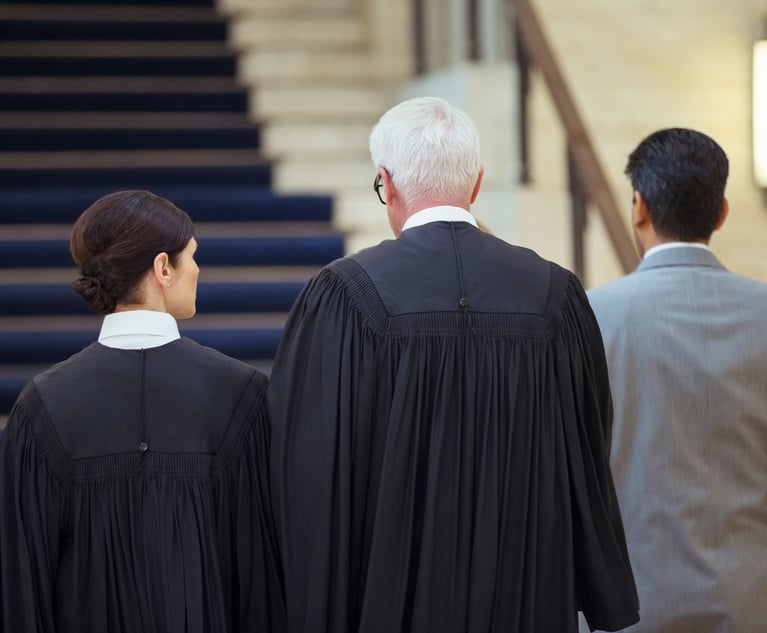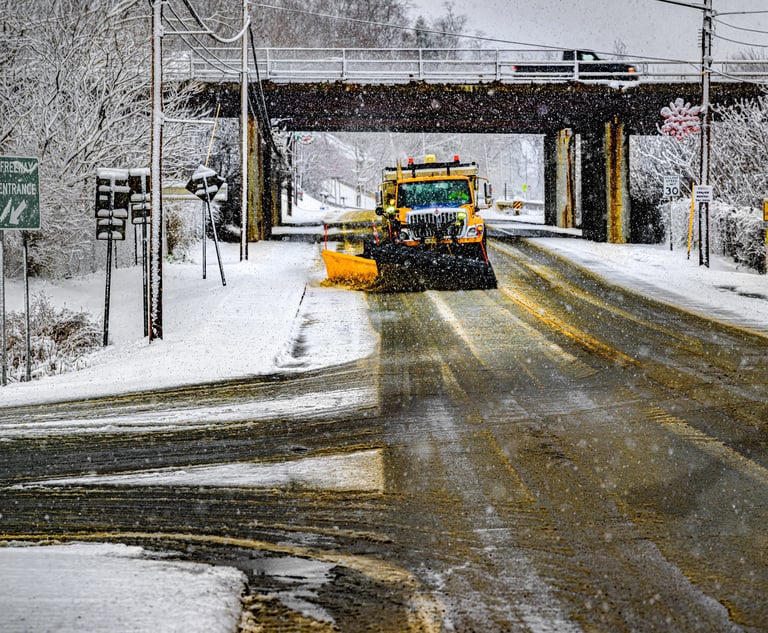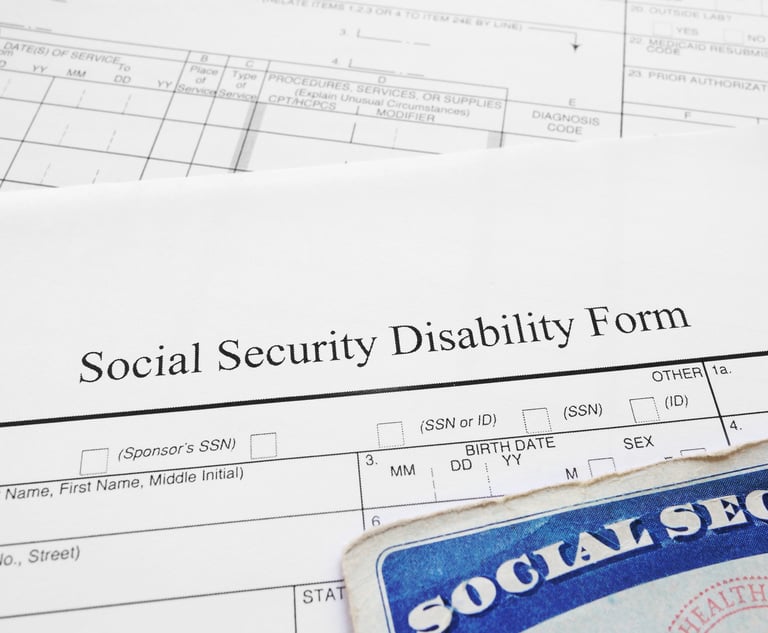Judicial Ethics Opinion 20-99
A town or village justice court must not "collaborate" or "work with" the district attorney's office or the local town/village prosecutor.
June 24, 2020 at 02:41 PM
11 minute read
The Advisory Committee on Judicial Ethics responds to written inquiries from New York state's approximately 3,600 judges and justices, as well as hundreds of judicial hearing officers, support magistrates, court attorney-referees, and judicial candidates (both judges and non-judges seeking election to judicial office). The committee interprets the Rules Governing Judicial Conduct (22 NYCRR Part 100) and, to the extent applicable, the Code of Judicial Conduct. The committee consists of 27 current and retired judges, and is co-chaired by former associate justice George D. Marlow of the Appellate Division and the Honorable Margaret Walsh, a justice of the Supreme Court.
Digest: (1) A town or village justice court must not "collaborate" or "work with" the district attorney's office or the local town/village prosecutor. (2) The court may nonetheless invite defense bar representatives and the appropriate prosecutorial office to discuss procedures for handling mail-in pleas on traffic infractions. (3) The court must not promote or favor mail-in pleas and/or plea bargaining over a defendant motorist's other options, even if this is intended to mitigate the effects of the COVID-19 outbreak. The court may, however, distribute a court-prepared form (such as UCS DCJA Form 1.0) impartially listing all options for a defendant motorist and include a link to the District Attorney's website and/or email address as a convenience to defendants.
Rules: 22 NYCRR 100.2; 100.2(A); 100.2(C); 100.3(B)(6); Opinions 19-163; 18-101; 18-73; 17-34; 16-09; 13-124/13-125/13-128/13-129; 13-33; 12-68; 09-118; 99-82.
Opinion: The inquiring judge asks if, during the current public health crisis, he/she may "encourage[]" judges under his/her supervision "to collaborate with prosecutors to develop procedures to process pleas on paper and to establish a mail-in plea bargaining process for defendants charged with VTL infractions." If permissible, the judge would direct town and village justices under his/her supervision to "work with either [their] ADA or local town/village prosecutor on procedures" that would "allow a defendant charged with a VTL infraction to elect to proceed without a personal appearance in order to mitigate the effects of the COVID-19 outbreak, and to control in-person traffic within town and village courts." The judge would further advise the justices: "If a plea-bargain is reached between the prosecutor and VTL defendant, the court should review same and promptly inform the parties if it is approved or denied. If approved, the court may impose sentencing. If denied, the parties should be advised of same so that further negotiations may take place. If ultimately no resolution is reached, the court may schedule a bench trial." [1]
A judge must always avoid even the appearance of impropriety (see 22 NYCRR 100.2) and must always promote public confidence in the judiciary's integrity and impartiality (see 22 NYCRR 100.2[A]). A judge must not convey, or permit others to convey, the impression that others are specially positioned to influence him/her (see 22 NYCRR 100.2[C]) and must avoid improper ex parte communications (see 22 NYCRR 100.3[B][6]).
As noted in Opinion 19-163 (citations omitted):
A judge must act to promote public confidence in the judiciary's integrity and impartiality and to preserve the judiciary's independence. Thus, judges must "maintain their independence from prosecutors and not participate or assist in what are essentially the prosecutor's duties."
Moreover, we have recognized the danger that a judge's impartiality will appear to be compromised when the circumstances of a proposed private meeting with the judge suggest that the meeting is essentially an attempt to promote a particular agenda in connection with the judge's judicial decision-making in certain matters that will come before the judge or otherwise to impermissibly influence the judge's future judicial conduct (see Opinion 13-124/13-125/13-128/13-129). Thus, when a public defender proposed to meet privately with judges to discuss implementation of the counsel-at-arraignment program, we advised (id. [citations omitted]):
To the extent that the public defender wishes to work with individual judges to develop policies, procedures or protocols to guide the court with respect to the counsel-at-arraignment program, the Committee believes that "working with representatives of only one side of an issue [to do so] could erode the public's confidence in the impartiality and independence of the judiciary." Moreover, to the extent that there is any identifiable pending or impending arraignment before a judge at the time of a private meeting with the public defender, there is also a risk such a meeting would involve, or appear to involve, impermissible ex parte communications.
Here too, with respect to apparently procedural matters, such as how the court will handle mail pleas on traffic infractions during the current public health crisis, we believe all stakeholders should be invited to participate. Accordingly, we believe the inquiring judge should not encourage local justices under his/her direction or supervision to "collaborate" or "work with" the district attorney's office or the local town/village prosecutor. The court may nonetheless invite defense bar representatives and the appropriate prosecutorial office to discuss procedures for handling mail-in pleas on traffic infractions.
As described in Opinion 18-101 (citations omitted):
Judges must maintain their independence from prosecutors and not participate or assist in "what is essentially the work of the prosecutor's office." Thus, a judge or court clerk "may not simply distribute the prosecutor's printed materials to defendants" or otherwise act as the prosecution's "agent or intermediary." For example, a court may not directly implement the DA's programs or procedures. Nor may the court simply inform defendants of the prosecuting agency's procedures for seeking a plea reduction without taking steps to prevent any "appearance of partiality or … indication that the court is predisposed towards a defendant's guilt."
Thus, for example, we have advised the court must not distribute an informational packet the District Attorney has prepared to inform defendants how they may request a reduction of an alleged Vehicle and Traffic Law violation pending in the judge's court (see Opinion 12-68) and must not simply advise a defendant motorist of a prosecutorial agency's procedures for seeking a plea reduction on traffic infractions (see Opinion 13-33). Likewise, justice court websites may not include extensive information promoting a DA's traffic diversion program, where the proposed language explains the program's goals and purported benefits to participants; provides detailed application instructions; and states that the program is intended to improve prosecutorial efficiency (see Opinion 18-101).
However, the court may distribute a form listing all of the defendant's options, including the right to plead not guilty and proceed to trial (see id.; Opinion 99-82). We note that DCJA Form 1.0 (attached to this opinion as an appendix) has been developed and vetted for this very purpose.
When communicating with a defendant motorist who has entered a guilty plea by mail to a Vehicle & Traffic Law charge, "[a] judge should not be in the position of advocating a negotiated plea or in any way indicating a predisposition in the matter" (Opinion 17-34). We noted in Opinion 16-09 that the inquiring judge's proposed letter "appears to compromise the impartiality of the judiciary because, rather than advising a defendant of all options available to him/her…, it rejects the option the defendant has already chosen and demonstrates a bias against accepting mail-in pleas." These risks, too, are minimized by use of the standard form advising the defendant motorist of all options available to him/her.
We have recognized that it is ethically permissible for a town justice to add the District Attorney's website address to the Office of Court Administration-approved information form (see Appendix) for defendants charged with Vehicle and Traffic Law violations (see Opinion 09-118 [noting the judge "should obtain approval from his/her administrative judge" before doing so]). Moreover, a justice court website may include a link to the DA's website as a convenience to defendant motorists (see Opinion 18-101). Here, too, particularly in light of current public health concerns, we can again see no ethical impropriety in supplementing the current UCS DCJA Form 1.0 with the email address and/or a link to the website of the appropriate prosecutorial office.
As before, the Committee cannot determine whether judges have the legal authority to introduce new steps or procedures for defendants who plead guilty by mail under Vehicle and Traffic Law 1805, as this presents a strictly legal question (see Opinion 18-73).
* * *
Formatting Note 6/23/2020: Our original opinion contains screenshots of the UCS DCJA Form 1.0 as received from the Resource Center. For purposes of posting the opinion online, we have attempted to convert the PDF document into a text-only format. It may be advisable to double-check the text against the original.
* * *
APPENDIX: UCS DCJA Form 1.0, reprinted by the Resource Center
June 2009
THIS FORM IS FOR INFORMATIONAL PURPOSES ONLY
STATE OF NEW YORK UNIFIED COURT SYSTEM
TOWN/VILLAGE COURT
TOWN/VILLAGE OF ______________________(address)
To: Individuals Charged with Traffic Infractions Pending in the _____________Town/Village Court
This court has received an accusatory instrument alleging that you have committed an offense. You are presumed innocent until proven guilty and you have the right to retain an attorney to represent you now, or at any stage in these proceedings.
You have various procedural options in the course of bringing this matter to a just disposition. You may choose to proceed in any of the following manners, or any other legally authorized manner. You may want to consult an attorney for guidance or representation before determining which course of action you will pursue. The court may not provide you with a recommendation as to how you should proceed, or as to which of these or any other options you should choose.
YOU MAY:
Plead Not Guilty.
By pleading "Not Guilty" you exercise your right to a public trial at which the People of the State of New York, represented by the prosecution, must prove, beyond a reasonable doubt, that you have committed the offense alleged in the accusatory instrument. At the trial you will have the right to hear, see and challenge the evidence submitted to prove your guilt, including, confronting, by cross-examination, the Police Officer, Peace Officer or other witness or witnesses who testify against you. You have the right to have witnesses testify on your behalf and you may, but you are not required to, testify on your own behalf. The court will determine, after hearing all the evidence submitted at the trial, whether or not the People have proven guilt beyond a reasonable doubt, and will render an appropriate verdict.
Plead Guilty as Charged.
By pleading "Guilty" you waive your right to a trial at which the People of the State of New York, represented by the prosecution, must prove beyond a reasonable doubt that you committed the offense alleged in the accusatory instrument. A Plea of Guilty will subject you to sentencing, by the judge presiding, to any legally authorized sentence. You may withdraw, with the court's permission, your plea of guilty at any time prior to sentencing and exercise your right to a trial.
Communicate with the Appropriate Prosecutorial Office Concerning an Alternative Disposition.
You may contact the Prosecutor or other official who is responsible for proving the charge or charges against you and negotiate an agreement to plead guilty to a legally authorized alternate offense, including a lesser included offense, or a less severe offense or offenses. Any proposed agreement is subject to approval by the court. Upon a plea of guilty to the agreed-upon offense, you will be subject to sentencing, by the judge presiding, to any sentence legally authorized to be imposed for the offense to which you plead guilty.
The prosecutorial office responsible to prove the charge or charges against you alleged in the accusatory instrument is the _____________________________________________ (District Attorney or Assistant District Attorney, Town Attorney, Village Attorney, etc.). The address and telephone number for that office is:
Prosecutor
Address
City, New York (zip code)
Telephone Number
THIS FORM IS FOR INFORMATIONAL PURPOSES ONLY
(UCS DCJA Form 1.0)
reprinted by the Resource Center June 2009
[1] The Committee notes that the inquiring judge's question came in before certain clarifications were issued; we do not comment on those clarifications, which are not before us.
This content has been archived. It is available through our partners, LexisNexis® and Bloomberg Law.
To view this content, please continue to their sites.
Not a Lexis Subscriber?
Subscribe Now
Not a Bloomberg Law Subscriber?
Subscribe Now
NOT FOR REPRINT
© 2024 ALM Global, LLC, All Rights Reserved. Request academic re-use from www.copyright.com. All other uses, submit a request to [email protected]. For more information visit Asset & Logo Licensing.
You Might Like
View AllTrending Stories
- 1Call for Nominations: Elite Trial Lawyers 2025
- 2Senate Judiciary Dems Release Report on Supreme Court Ethics
- 3Senate Confirms Last 2 of Biden's California Judicial Nominees
- 4Morrison & Foerster Doles Out Year-End and Special Bonuses, Raises Base Compensation for Associates
- 5Tom Girardi to Surrender to Federal Authorities on Jan. 7
Who Got The Work
Michael G. Bongiorno, Andrew Scott Dulberg and Elizabeth E. Driscoll from Wilmer Cutler Pickering Hale and Dorr have stepped in to represent Symbotic Inc., an A.I.-enabled technology platform that focuses on increasing supply chain efficiency, and other defendants in a pending shareholder derivative lawsuit. The case, filed Oct. 2 in Massachusetts District Court by the Brown Law Firm on behalf of Stephen Austen, accuses certain officers and directors of misleading investors in regard to Symbotic's potential for margin growth by failing to disclose that the company was not equipped to timely deploy its systems or manage expenses through project delays. The case, assigned to U.S. District Judge Nathaniel M. Gorton, is 1:24-cv-12522, Austen v. Cohen et al.
Who Got The Work
Edmund Polubinski and Marie Killmond of Davis Polk & Wardwell have entered appearances for data platform software development company MongoDB and other defendants in a pending shareholder derivative lawsuit. The action, filed Oct. 7 in New York Southern District Court by the Brown Law Firm, accuses the company's directors and/or officers of falsely expressing confidence in the company’s restructuring of its sales incentive plan and downplaying the severity of decreases in its upfront commitments. The case is 1:24-cv-07594, Roy v. Ittycheria et al.
Who Got The Work
Amy O. Bruchs and Kurt F. Ellison of Michael Best & Friedrich have entered appearances for Epic Systems Corp. in a pending employment discrimination lawsuit. The suit was filed Sept. 7 in Wisconsin Western District Court by Levine Eisberner LLC and Siri & Glimstad on behalf of a project manager who claims that he was wrongfully terminated after applying for a religious exemption to the defendant's COVID-19 vaccine mandate. The case, assigned to U.S. Magistrate Judge Anita Marie Boor, is 3:24-cv-00630, Secker, Nathan v. Epic Systems Corporation.
Who Got The Work
David X. Sullivan, Thomas J. Finn and Gregory A. Hall from McCarter & English have entered appearances for Sunrun Installation Services in a pending civil rights lawsuit. The complaint was filed Sept. 4 in Connecticut District Court by attorney Robert M. Berke on behalf of former employee George Edward Steins, who was arrested and charged with employing an unregistered home improvement salesperson. The complaint alleges that had Sunrun informed the Connecticut Department of Consumer Protection that the plaintiff's employment had ended in 2017 and that he no longer held Sunrun's home improvement contractor license, he would not have been hit with charges, which were dismissed in May 2024. The case, assigned to U.S. District Judge Jeffrey A. Meyer, is 3:24-cv-01423, Steins v. Sunrun, Inc. et al.
Who Got The Work
Greenberg Traurig shareholder Joshua L. Raskin has entered an appearance for boohoo.com UK Ltd. in a pending patent infringement lawsuit. The suit, filed Sept. 3 in Texas Eastern District Court by Rozier Hardt McDonough on behalf of Alto Dynamics, asserts five patents related to an online shopping platform. The case, assigned to U.S. District Judge Rodney Gilstrap, is 2:24-cv-00719, Alto Dynamics, LLC v. boohoo.com UK Limited.
Featured Firms
Law Offices of Gary Martin Hays & Associates, P.C.
(470) 294-1674
Law Offices of Mark E. Salomone
(857) 444-6468
Smith & Hassler
(713) 739-1250










